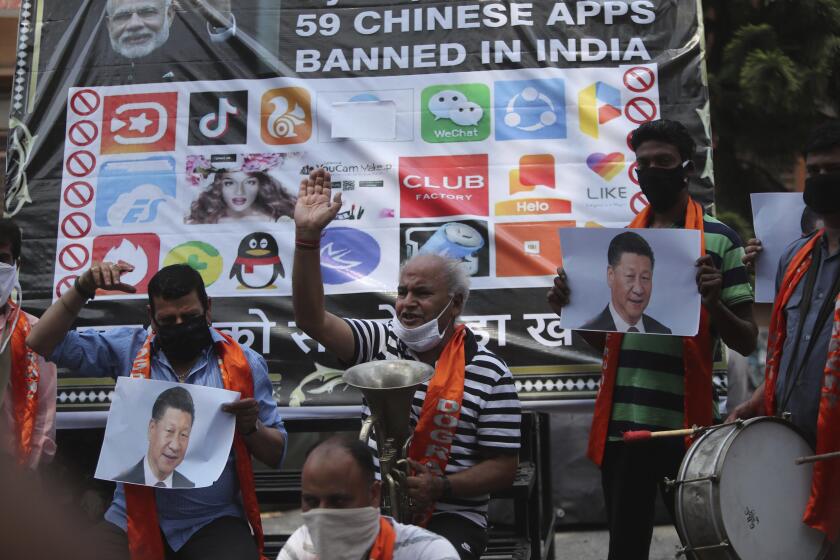Popular TikTok stars to leave platform for rival app over data privacy concerns
When Josh Richards first began posting lip-syncing videos as a high school freshman four years ago, he never imagined he would one day become a huge TikTok star. Since then, Richards, 18, has amassed more than 20 million followers on the popular video streaming app.
But now Richards has decided to leave the platform that made him a star, citing growing concerns about TikTok’s Chinese parent company ByteDance and how it manages user data.
The Studio City influencer, along with other TikTok creators, announced Tuesday they are moving to a rival app, L.A.-based Triller, and will encourage their millions of fans to join them there.
“After seeing the U.S. and other countries’ governments’ concerns over TikTok — and given my responsibility to protect and lead my followers and other influencers — I followed my instincts as an entrepreneur and made it my mission to find a solution,” Richards said.
The actor and performer has been hired to be chief strategy officer at L.A.-based Triller, a music video app that counts rappers such as Snoop Dogg and Lil Wayne as investors. Fellow TikTok creators Griffin Johnson, Noah Beck and Anthony Reeves are also signing on as Triller advisors and are equity shareholders. They declined to disclose their investment level.
The move is significant because it is one of the first organized U.S. efforts among prominent TikTok influencers to get people off the platform. Combined, the four TikTok influencers have an audience of nearly 47 million followers.
The announcement comes at a delicate time for TikTok, which is facing growing scrutiny from the U.S. government over how it manages customer data. Some Trump administration officials said they are considering banning the app amid a growing U.S.-China trade war. Some analysts believe such heated rhetoric suggests that TikTok has become a pawn in a political game between the countries.
TikTok has experienced exploding popularity, especially during the COVID-19 pandemic as people look for ways to entertain themselves at home. The app has become an accepted way for musicians and celebrities to reach fans through songs and dance performances.
TikTok, a popular based social video app owned by China-based ByteDance, has seen explosive growth this year amid the coronavirus crisis. The company has plans to hire more people, including at its Culver City office.
Whether fans will follow their favorite influencers and ditch TikTok remains to be seen. TikTok was the most installed app globally as of last week and ranked second after Zoom in the U.S., according to San Francisco mobile research firm Sensor Tower. So far, its downloads haven’t been negatively disrupted by concerns raised by U.S. Secretary of State Mike R. Pompeo.
TikTok has distanced itself from its Chinese roots. The company recently named former Disney executive Kevin Mayer as its chief executive and said U.S. user data are stored in the U.S. and Singapore.
“Protecting the privacy of our users’ data is of the utmost importance to TikTok,” the company said in a statement last week. “We have not, and would not, give it to the Chinese government.”
Kevin Mayer, new TikTok CEO, has been head of Disney’s direct-to-consumer and international segment since 2018. His hiring is considered a coup for the popular mobile video app.
Although TikTok’s parent company, ByteDance, is incorporated in the Cayman Islands, it was founded in China and is based there. TikTok says it plans on growing its staff of roughly 1,400 people in the U.S. by an additional 10,000 people over the next three years.
But ByteDance’s ties to China remain an area of concern because of the Chinese government’s ability to compel companies to give it data when it relates to national security.
In May, TikTok was accused of suppressing Black Lives Matter-related content in the U.S. TikTok said that it was a technical glitch that made posts uploaded with #BlackLives Matter and #GeorgeFloyd appear as if they had no views.
The political backlash against TikTok has benefited other social apps such as Triller, which specializes in sharing music videos and has licensing deals with music companies including Universal Music Group.
Although Triller does not consider TikTok a direct competitor because its users tend to be older, that could change as more digital creators move to its app.
The Chinese video-sharing app is booted from its biggest foreign market as India retaliates for a deadly border clash.
Founded as a music video editing tool in 2015, Triller has also grown exponentially, drawing about 64 million active users a month, up from just 2 million three years ago, company executives said.
“It’s been a tremendous growth,” Triller CEO Mike Lu said. “This notion of social streaming is something that’s very unique to us and it speaks to the identity of Triller.”
Triller’s majority owner is Proxima Media, whose founder is Ryan Kavanaugh, the once high-flying mogul behind Relativity Media, the mini-major studio that filed for bankruptcy in 2015 and struggled to stage a comeback.
Some influencers who plan to defect from TikTok said they would continue posting on the app but over time it will be less frequently. Johnson said he posts usually two to three times a day on TikTok and that will probably drop to once a day and eventually every couple of days.
“We will be posting but a lot of our posts will be more trying to move them off of that platform onto Triller,” Johnson said.
Still, Triller’s user base is vastly smaller than TikTok’s. Triller estimates it has about 130 million downloads. That’s compared with the nearly 2.3 billion global downloads of TikTok, according to Sensor Tower.
Triller makes money through brand partnerships, sponsorships and other initiatives. The company stores its user data in the U.S. and Britain. The company has worked with artists such as Eminem to promote his music.
More to Read
Inside the business of entertainment
The Wide Shot brings you news, analysis and insights on everything from streaming wars to production — and what it all means for the future.
You may occasionally receive promotional content from the Los Angeles Times.














